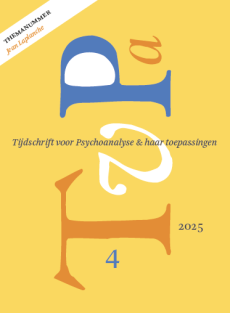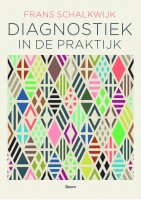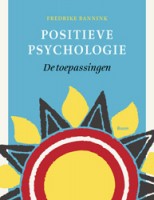Leeranalyse verplicht voor psychoanalytisch psychotherapeuten?
Summary
One of the training requirements of the Dutch Society for Psychoanalytical Psychotherapy (NVPP) is a training analysis, currently of a minimum duration of 700 hours. During the last few years this requirement has become somewhat controversial. Because the NVPP has no information about current interest in NVPP membership, the board of the NVPP decided to conduct a survey. Of 995 psychiatrists, clinical psychologists and psychotherapists, who finished their training recently, or are still in training, 623 filled in a questionnaire. Of those interested in the NVPP training, 39% judged the training analysis as not feasible in terms of time and 61% as not feasible in terms of money. Forms of personal treatment thought desirable for anyone who wishes to become a psychoanalytic psychotherapist at a specialist level were: psychoanalytic psychotherapy (63%), psychoanalysis (39%), psychoanalytic group psychotherapy (25%), and psychoanalytic marriage or family therapy (6%). Respondents who judge personal analysis as unfeasible also tend to judge psychoanalysis to be equivalent to other forms of psychoanalytic psychotherapy, whereas those who judge personal analysis as feasible tend to think that personal analysis is essential for a psychoanalytical psychotherapist at the specialist level.
Literatuur
- Balint, M. (1954), Analytic training and training analysis. International Journal of Psycho-Analysis, 35, p. 157-162.
- Battegay, R. (1990), Complementary individual and group analytic training for future psychotherapists. Psychotherapy & Psychosomatics, 53, p. 130-134.
- Blécourt, A. de (1990), Een psychoanalytische opleiding. Tijdschrift voor Psychotherapie, 16, p. 220-238.
- Fancher, E. (1990), A training analysis for psychoanalytic psychotherapists. Psychoanalytic Review, 77, p. 41-57.
- Freeman, Th. (1991), Hobson’s choice: Personal analysis and supervision in the training of psychoanalytic psychotherapists. British Journal of Psychotherapy, 8, p. 202-205.
- Freud, S. (1919), Wegen der psychoanalytische therapie. Nederlandse Editie: Klinische Beschouwingen 4, p. 188-189. Boom, Meppel/Amsterdam (1992).
- Freud, S. (1925), De weerstanden tegen de psychoanalyse. Nederlandse Editie: Klinische Beschouwingen 2, p. 90-103 (1991).
- Klerk. A. de (1996), brief aan de auteur, d.d. 10 juni 1996.
- Langs, R. (1984), The framework of training analyses. International Journal of Psychoanalytic Psychotherapy, 10, p. 259-287.
- McLaughlin, F. (1974), A discussion of the paper by Daniel Shapiro on ‘the training setting in training analysis: A retrospective view of the evaluative and reporting role and other “hampering” factors’. International Journal of Psycho-Analysis, 55, p. 307-309.
- Pedder, J. (1990), Lines of advance in psycho-analytic psychotherapy. Psychoanalytic Psychotherapy, 4, p. 201-217.
- Rawn, M.L. (1991), Training analysis and training psychotherapy. Psychoanalytic Psychology, 8, p. 43-57.
- Shapiro, D. (1974), The training setting in training analysis: a retrospective view of the evaluative and reporting role and other ‘hampering factors’. International Journal of Psycho-Analysis, 55, p. 297-306.
- Simenauer, E. (1984), Aktuelle Probleme der Lehranalyse. Psyche, 38, p. 289-306.
- Steiner, J. (1985), The training of Psychotherapists. Psychoanalytic Psychotherapy, 1, p. 55-63.
- Strachwitz, E. Von (1974), Report on the discussion of working group. Zeitschrift für Psychosomatische Medizin und Psychoanalyse, 20, p. 275-277.
- Thiel, J.H. (1980), De ambigue positie van de psychoanalyse in de psychotherapeutische wereld. In: B. Frijling-Schreuder, J. Lampl-de Groot, N. Treurniet e.a. Psychoanalytici aan het woord. Van Loghum Slaterus, Deventer.
- Thomä, H. (1991a), Idee und Wirklichkeit der Lehranalyse. Ein Plädoyer für Reformen(I). Psyche, 45, p. 385-433.
- Thomä, H. (1991b), Idee und Wirklichkeit der Lehranalyse. Ein Plädoyer für Reformen (II). Psyche, 45, p. 481-505.
- Trijsburg R.W., H.J. Duivenvoorden, D.L. Stronks e.a. (1994), Leertherapie in Nederland. Tijdschrift voor Psychotherapie, 20, p. 2-30.
- Trijsburg R.W., H.J. Duivenvoorden & A. van ‘t Spijker (1996), Psychotherapie: opleidingen en specialismen. Maandblad Geestelijke volksGezondheid, 51, p. 629-634.
 © 2009-2026 Uitgeverij Boom Amsterdam
© 2009-2026 Uitgeverij Boom Amsterdam
ISSN 1382-516x
De artikelen uit de (online)tijdschriften van Uitgeverij Boom zijn auteursrechtelijk beschermd. U kunt er natuurlijk uit citeren (voorzien van een bronvermelding) maar voor reproductie in welke vorm dan ook moet toestemming aan de uitgever worden gevraagd:
Behoudens de in of krachtens de Auteurswet van 1912 gestelde uitzonderingen mag niets uit deze uitgave worden verveelvoudigd, opgeslagen in een geautomatiseerd gegevensbestand, of openbaar gemaakt, in enige vorm of op enige wijze, hetzij elektronisch, mechanisch door fotokopieën, opnamen of enig andere manier, zonder voorafgaande schriftelijke toestemming van de uitgever.
Voor zover het maken van kopieën uit deze uitgave is toegestaan op grond van artikelen 16h t/m 16m Auteurswet 1912 jo. Besluit van 27 november 2002, Stb 575, dient men de daarvoor wettelijk verschuldigde vergoeding te voldoen aan de Stichting Reprorecht te Hoofddorp (postbus 3060, 2130 KB, www.reprorecht.nl) of contact op te nemen met de uitgever voor het treffen van een rechtstreekse regeling in de zin van art. 16l, vijfde lid, Auteurswet 1912.
Voor het overnemen van gedeelte(n) uit deze uitgave in bloemlezingen, readers en andere compilatiewerken (artikel 16, Auteurswet 1912) kan men zich wenden tot de Stichting PRO (Stichting Publicatie- en Reproductierechten, postbus 3060, 2130 KB Hoofddorp, www.cedar.nl/pro).
No part of this book may be reproduced in any way whatsoever without the written permission of the publisher.
Nieuwsbrief Boom Psychologie
Meld u nu aan en ontvang maandelijks de Boom Psychologie nieuwsbrief met aantrekkelijke aanbiedingen en de nieuwe uitgaven.
Aanmelden


